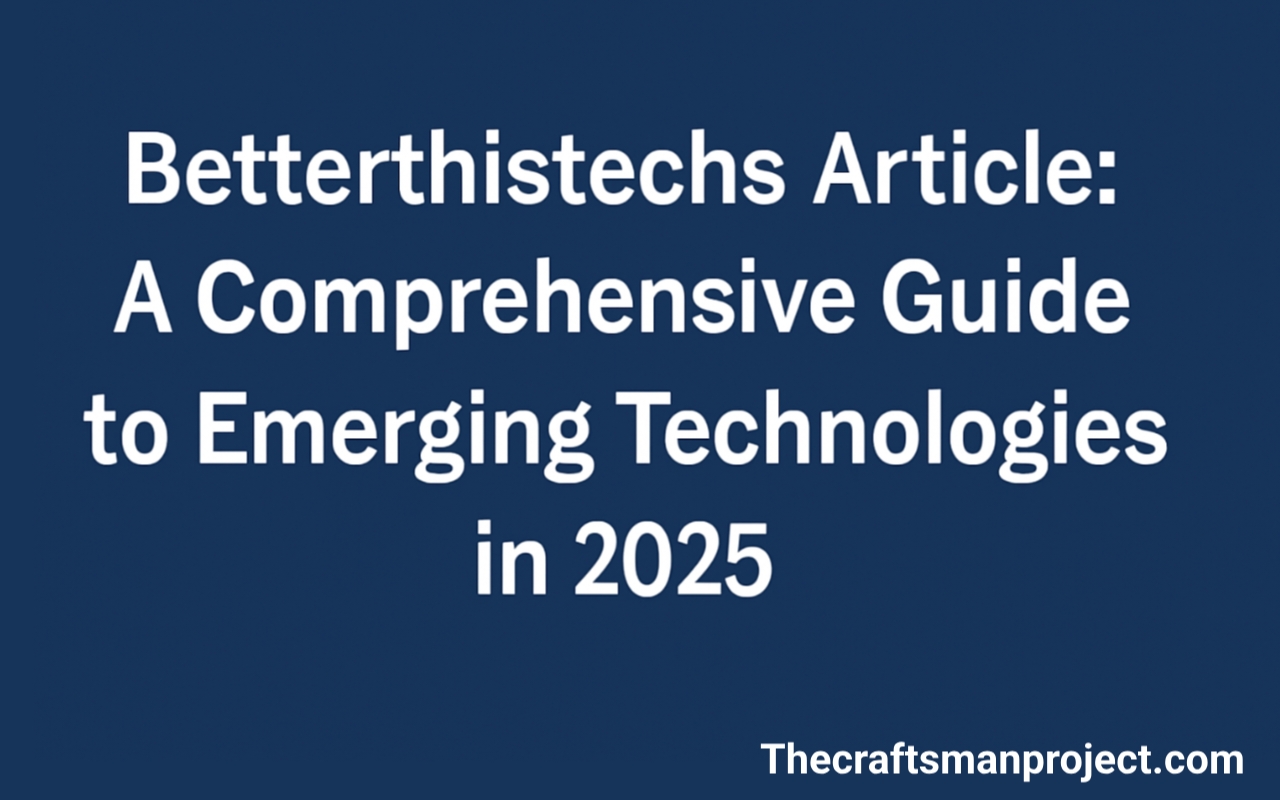Introduction
In the fast-paced world of technology, staying ahead of the curve is essential for businesses, consumers, and innovators alike. Betterthistechs, a platform dedicated to delivering the latest insights and deep dives into cutting-edge technologies, is at the forefront of this knowledge-sharing movement. The mission of Betterthistechs is to empower individuals and organizations by offering well-researched, informative articles that explore the vast and rapidly evolving world of technology.
At Betterthistechs, the team curates content on a range of technological topics, ensuring that readers have access to the most up-to-date, accurate, and engaging information. From artificial intelligence to blockchain, from virtual reality to sustainable tech, Betterthistechs covers it all. The platform is designed for tech enthusiasts, industry professionals, and anyone curious about the future of technology. Its ultimate goal is to inspire its audience to embrace technological change, understand its potential, and stay informed about the developments shaping the world of tomorrow.
The Role of Technology in Modern Society
Technology is not just a tool; it’s the foundation upon which modern societies are built. From the smartphones in our pockets to the software that powers the global economy, technology has revolutionized every aspect of our lives. In recent decades, its pace of evolution has been breathtaking, bringing with it both unprecedented opportunities and challenges.
The role of technology in society has become so ingrained that it’s often hard to imagine life without it. Consider the impact of social media, which connects billions of people globally, or the role of e-commerce in reshaping the retail landscape. Similarly, artificial intelligence (AI) is enabling businesses to enhance their customer service, optimize supply chains, and even predict consumer behavior with incredible accuracy. Technology has made life easier, faster, and more connected, but it’s also brought challenges such as job displacement, data privacy concerns, and the digital divide.
In the coming years, as technology continues to evolve at a rapid pace, its influence on society will only grow. The next frontier lies in how we navigate this change. How do we ensure that the benefits of technology are shared equitably across society? How do we address the ethical issues that arise with new innovations? These questions will shape the future of technology and its integration into everyday life.
Top Emerging Technologies in 2025
As we approach 2025, several technologies are poised to redefine our world. These technologies hold the promise of transforming industries, improving quality of life, and solving some of humanity’s most pressing challenges. Below, we take a closer look at the key emerging technologies that will shape the landscape in 2025.
Artificial Intelligence and Machine Learning
Artificial Intelligence (AI) and Machine Learning (ML) are no longer just buzzwords; they are the driving forces behind many of the innovations we see today. AI and ML are being integrated into an increasing number of industries, enabling machines to perform tasks that were once thought to require human intelligence.
AI, for instance, is now a key player in automating customer service, where chatbots can answer questions, resolve issues, and provide personalized recommendations in real-time. In healthcare, AI is being used to analyze medical images, assist in diagnostics, and even predict patient outcomes. Meanwhile, machine learning algorithms are making waves in financial markets by identifying trends and making investment decisions at speeds that humans simply cannot match.
But AI’s true potential lies in its ability to create intelligent systems that can think and learn autonomously. In 2025, we can expect even more breakthroughs in natural language processing (NLP), where machines can understand and generate human-like language, making interactions with technology even more seamless and intuitive. The future of AI and ML is vast, and it will undoubtedly continue to influence nearly every facet of our daily lives.
Quantum Computing
Quantum computing is one of the most exciting and potentially transformative technologies of the 21st century. Unlike classical computers, which process information in binary (using bits that are either 0 or 1), quantum computers leverage the principles of quantum mechanics to perform calculations with quantum bits (qubits). These qubits can exist in multiple states simultaneously, allowing quantum computers to process information exponentially faster than classical computers.
While quantum computing is still in its infancy, significant strides are being made toward practical applications. In 2025, we expect to see more tangible developments in the quantum space, particularly in fields such as cryptography, materials science, and drug discovery. Quantum computers have the potential to solve problems that are currently beyond the reach of even the most powerful supercomputers, such as simulating complex chemical reactions or breaking encryption algorithms.
The commercial and scientific potential of quantum computing is vast. By accelerating research and development in various fields, quantum computers could revolutionize industries ranging from healthcare to logistics to climate science. However, the technology also brings challenges, particularly around cybersecurity, as quantum computers could potentially crack encryption systems that are currently deemed unbreakable.
Blockchain and Decentralized Finance (DeFi)
Blockchain technology is best known for being the foundation of cryptocurrencies like Bitcoin and Ethereum, but its applications extend far beyond digital currencies. Blockchain is essentially a distributed ledger that records transactions across multiple computers, ensuring transparency, security, and immutability. This technology has the potential to disrupt numerous industries, including finance, healthcare, and supply chain management.
In the financial sector, blockchain is enabling the rise of Decentralized Finance (DeFi), a system that allows people to conduct financial transactions without relying on traditional banks or intermediaries. DeFi platforms offer services such as lending, borrowing, and trading, all powered by blockchain and smart contracts. These decentralized systems are more secure, transparent, and accessible, providing an alternative to the centralized financial systems that have dominated for centuries.
Blockchain’s impact is not limited to finance. In supply chain management, for example, blockchain can provide an immutable record of goods as they move through the supply chain, reducing fraud and increasing transparency. In healthcare, blockchain can ensure secure and accurate tracking of patient data, improving the quality of care. As blockchain continues to mature, it will unlock new possibilities for decentralized applications and transform the way we interact with data and financial systems.
Extended Reality (XR) and the Metaverse
Extended Reality (XR), which encompasses Virtual Reality (VR), Augmented Reality (AR), and Mixed Reality (MR), is one of the most exciting technological frontiers in 2025. XR technologies enable immersive, interactive experiences that blend the physical and digital worlds. While VR and AR are already being used in gaming and entertainment, the potential for XR extends far beyond these sectors.
In the Metaverse, a fully immersive virtual world where people can interact with each other and digital environments, XR will play a central role. The Metaverse promises to create new ways of socializing, working, and even shopping, all within a digital environment. Companies like Meta (formerly Facebook) are investing heavily in the development of the Metaverse, which could become a major platform for virtual reality experiences, social interactions, and even business transactions.
XR technologies will also revolutionize industries such as education, healthcare, and retail. Imagine attending a virtual class where you can interact with your instructor and classmates in a fully immersive environment or visiting a virtual store and trying on clothes using AR before making a purchase. The possibilities for XR are vast, and as the technology continues to evolve, it will have a profound impact on how we experience the world.
5G and Beyond: The Future of Connectivity
5G networks are set to revolutionize connectivity by providing faster speeds, lower latency, and greater capacity than ever before. With 5G, mobile devices will be able to download data at speeds that were previously unimaginable, enabling real-time communication, high-quality video streaming, and smoother online gaming experiences.
In addition to improving mobile connectivity, 5G will drive the growth of the Internet of Things (IoT), where billions of interconnected devices will communicate seamlessly. From smart homes to autonomous vehicles, 5G will provide the infrastructure needed to enable the next generation of connected devices.
Looking beyond 5G, research into 6G technology is already underway. While 6G is still in the conceptual stage, it promises to take connectivity to new heights, with speeds up to 100 times faster than 5G. 6G will enable even more advanced applications, such as holographic communication, real-time brain-machine interfaces, and intelligent connectivity for entire cities.
Sustainable Technologies and Green Innovations
As climate change and environmental degradation continue to pose significant challenges to the planet, sustainable technologies are more important than ever. The transition to a greener, more sustainable future is being driven by innovations in renewable energy, electric vehicles, energy-efficient buildings, and waste management.
In 2025, we can expect to see significant progress in the adoption of renewable energy sources like solar and wind, which are becoming increasingly cost-effective and accessible. Energy storage technologies, such as advanced batteries, will help address the intermittency of renewable energy, enabling a more reliable and sustainable power grid.
Electric vehicles (EVs) will also continue to gain traction, with more affordable and efficient models hitting the market. As the global shift towards electrification accelerates, EVs will play a crucial role in reducing carbon emissions from the transportation sector.
The Impact of These Technologies on Various Industries
Emerging technologies will have a profound impact on nearly every industry. From healthcare to finance to entertainment, the way businesses operate will be fundamentally transformed.
Healthcare
In healthcare, AI, blockchain, and quantum computing will revolutionize diagnostics, patient care, and medical research. AI-driven tools will assist doctors in diagnosing diseases with higher accuracy, while quantum computers will help scientists develop new drugs and therapies at an unprecedented pace. Blockchain will secure patient data and streamline healthcare processes, ensuring transparency and efficiency.
Education
XR technologies will redefine how we learn and interact with educational content. Virtual classrooms and immersive learning experiences will make education more engaging and accessible to students around the world. AI-powered tools will also enable personalized learning, tailoring educational content to individual needs.
Finance
Blockchain and AI will continue to transform the financial industry, making transactions more secure and efficient. Decentralized finance (DeFi) will empower individuals to control their financial assets, while AI will help investors make smarter decisions by analyzing large amounts of data in real-time.
Entertainment
XR technologies and the Metaverse will reshape the entertainment industry, providing new ways for people to engage with content. Virtual concerts, immersive video games, and interactive experiences will become the norm, offering a more engaging and dynamic form of entertainment.
Ethical Considerations and Challenges
As these technologies continue to evolve, they bring with them significant ethical considerations. Issues such as data privacy, algorithmic bias, and the digital divide must be addressed to ensure that technology benefits all people, not just a select few.
Data Privacy
With the proliferation of connected devices and the rise of AI, data privacy has become a major concern. Ensuring that personal data is protected from misuse and exploitation will be crucial in maintaining public trust in emerging technologies.
Algorithmic Bias
As AI systems become more advanced, the potential for algorithmic bias also increases. It is essential to ensure that AI systems are trained on diverse datasets to avoid perpetuating existing biases, particularly in areas like hiring, criminal justice, and lending.
The Digital Divide
The digital divide remains a significant challenge, with access to technology being limited in certain regions and demographics. Bridging this gap will be essential to ensure that all individuals can benefit from the advancements of emerging technologies.
Read More: Thecraftsmanproject.com
Conclusion: Embracing the Future of Technology
The technologies of 2025 promise to bring about significant changes to our world, offering exciting opportunities for innovation, growth, and sustainability. As we continue to embrace these advancements, it is essential to address the ethical challenges they present and ensure that their benefits are shared equitably across society. The future is bright, and Betterthistechs will continue to provide valuable insights to help you navigate this rapidly changing landscape.

